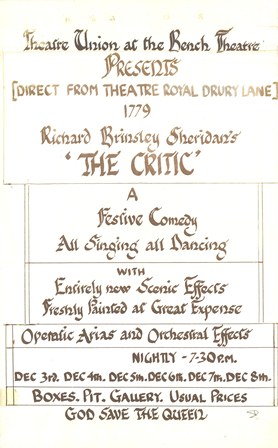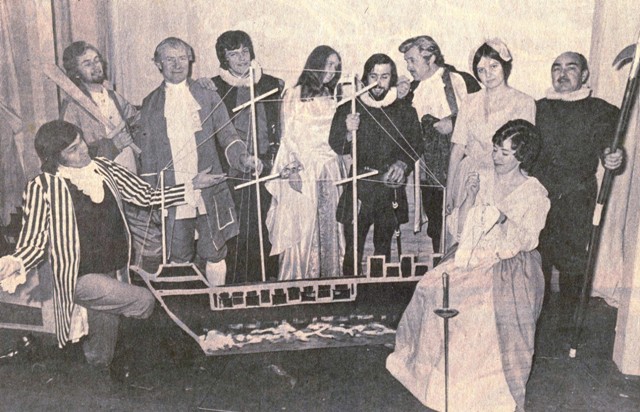The Bench Production

This play was staged under Bench Theatre's original company name of Theatre Union, at their theatre in West Street. It was actually the building in West Street, Havant where most of the Company's early plays were staged, which was called the Bench Theatre (after its prior use as a magistrates' court). The company's name was changed gradually by word of mouth and general usage between the years 1973 - 1977 when reviewers, and then members themselves, gradually stopped referring to Theatre Union and started calling the company of players 'Bench Theatre'. The new Company name of Bench Theatre was adopted in to all the promotional literature after they moved from the old theatre (which had been their home for nearly 7 years) in to the Old Town Hall building in East Street.
Cast
The Play
| Dangle | Mr Wilson |
| Sneer | Mr Lings |
| Sir Fretful Plagiary | Mr Osborne |
| Signor Pasticcio Ritornello | Mr Montefiore |
| Interpreter | Mr Anderson |
| Under Prompter | Mr King |
| Puff | Mr Mahoney |
| Mrs Dangle | Mrs Prowse |
| Signore Pasticcio Ritornello | Mrs Star |
| Servants | Mrs Moore Miss Jones Mrs Jevons Miss Randall Miss Bridle |
The Tragedy
| Lord Burleigh | Mr Corrigan |
| Governor of Tilbury | Mr Montefiore |
| Earl Of Leicester | Mr Noble |
| Sir Walter Raleigh | Mr Anderson |
| Sir Christopher Hatton | Mr Ream |
| Master of the Horse | Mr Spackman |
| Don Ferolo Wiskerandos | Mr Osborne |
| Beefeater | Mr Noble |
| Justice | Mr Spackman |
| Son | Miss Bridle |
| Constable | Mr Ream |
| Thames | Mrs Jevons |
| Tilburina | Miss Caddy |
| Confidante | Mrs Starr |
| Justice's Lady | Mrs Daines |
| First Niece | Miss Jones |
| Second Niece | Mrs Jaques |
| Britannia | Miss Randall |
Director's Notes
This play comes from the same pen which wrote 'The Rivals' and 'School for Scandal'. It is a joyous attack on the more ludicrous theatrical mannerisms of Sheridan's day. It is a play about actors, actresses and about the theatre and lovers of the theatre. It lovingly knocks the whole crazy business of putting on plays. It is a sort of celebration of the theatre itself and seems just the right thing to put on in the glum days of winter. We hope you will warm to the wit and laugh at the nonsense of it as we did rehearsing it.
John Scadding
Reviews
The NewsA.W.G.
Warm reception for Bench's Sheridan
Visitors to Havant's Bench Theatre can always be sure of one thing: the versatile Theatre Union company will have some surprises in store. Few artists work in such confined space as the old court house, but for every production it is magically transformed, so that one is never sure which part of the floor will be stage and which auditorium. On occasions the dividing line is so blurred that players and audience literally rub shoulders. The big surprise in the latest offering, Sheridan's 'The Critic', is that the tiny venue has been converted into a traditional 18th century auditorium and proscenium stage, creating an illusion that each is about twice life-size. Thanks to a timely civic grant, seating and heating has been vastly improved.
'The Critic' is a highly ambitious undertaking, given the limitations of the theatre. With more than 20 artists on stage, and a realistic representation of Drake's fire ships clashing with galleons of the Spanish Armada in the finale, the production calls for ingenuity in direction that at times defies the laws of space and motion. In the most ideal circumstances this is not the easiest of Sheridan's plays to put over. It suffers from a lack of balance, in that the first act is mainly stagy talk, calling for great skill in holding an audience, while the second is packed with lively action and fun. In trying to give the opening act pace was a first-night tendency to trip over the dialogue so zestfully that at times it became almost incoherent, but this should be overcome as the production shakes down. Mr and Mrs Dangle (Clive Wilson and Cindy Prowse) work hard to get the play moving, and show nice judgement in the characterisations. Tim Mahoney as Puff, brings his customary talent to bear in the role of the playwright whose brainchild forms the second act. But this introductory piece is dominated by Ray Osborne's Sir Fretful Plagiary, whose exchanges with the critics of his own play are pure fun, laced with cruelly sharpened barbs timeless in their topicality.
In the second act the whole cast enjoys itself immensely, its enthusiasm bubbling over into the audience as Puff tries to explain the subtleties of his play to critics Dangle and Sneer (David Lings) and wrestles tirelessly with a cast he thinks is mangling his 'immortal' lines. Ingrid Caddy as Tilburina and her confidante, Tony Starr, are splendid in the mad scene, and the sea-battle climax is a real tour-de-force. A merry prologue, contrived by Messrs Scadding and Spackman, in which the Spirit of Theatre Union is joyously by Mrs Morgan is a lively launching pad for what follows. The company deserves an A+ marking for enterprise in tackling a play that would daunt many producers blessed with all the facilities of a full-sized stage. June Jaques deserves special mention for designing and executing their costumes.
The News, 4th December 1973
